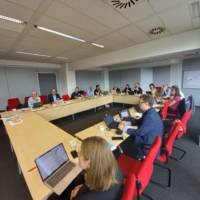On cross-border mobility at the University of Twente
Border studies + Knowledge sharing | 09 July 2024
Border studies + Knowledge sharing | 09 July 2024
At the invitation of Elifcan Karacan, Assistant Professor of the University of Twente, on the 5th July 2024, experts of eight EU Member States discussed the issue of intra-EU mobility. CESCI was represented by the secretary general, Gyula Ocskay.
At the event, after the greetings of Professor René Torenvlied, three round-table discussions took place. The topic of the first one was given by the border asymmetries and their impacts on labour mobility. Anita Böcker (Radboud University, NL) and Ingrid Jungvirth (Rhine-Waal University, DE) talked about the phenomena relating to cross-border mobility of the eastern European workers across the Dutch-German border. Hynek Böhm (Technical University of Liberec, CZ) and Wojciech Opiola (University of Opole, PL) presented the conditions for cross-border mobility at the Czech-Polish border which have been spotlighted by the measures taking effect during the COVID-19 pandemic. That was the time, when it became clear that – against the official statistical data – much more, nearly 250 thousand people are commuting at the Czech-Polish-German tri-border area.
The participants of the second panel, namely: Caroline Fischer (University of Twente), Ricardo Ferreira (representing the European Commission), and Gyula Ocskay (from CESCI) discussed the governance aspects of mobility. The first speaker highlighted the significance of the institutionalised frames for cross-border health. Ricardo Ferreira presented the measures through which the Commission tries to promote the elimination of the barriers hindering cross-border mobility. Our secretary general spoke about the current mobility trends and the role of the differences playing therein, based on the experiences of the ongoing ACCESS project.
The last panel focused on the crises. Isabelle Pigeron-Piroth (University of Luxemburg) through datasets presented how strongly is the labour market of Luxemburg dependent on open borders (there are sectors where 70% of the workers are foreigners). The closures generated by the pandemic would have endangered even the operability of the country. Peter Hansen not only represented the Sonderjylland-Schleswig Region (DK), but, as it became clear, he is the coordinator for cross-border mobility at the German-Danish border, so, he can actively contribute to the elimination of the obstacles. Martin Unfried (University of Maastricht, NL) presented their research projects targeting the impacts of the pandemic and, especially, the drawbacks of the centralised solutions applied. These solutions have generated irrational circumstances like the one that from Maastricht, located at the German-Dutch-Belgian tri-border area, anyone could travel several hundreds of kms to Rotterdam, but could not do that to the neighbouring German municipality.
As the organiser of the event, Elifcan Karacan summed-up, the information and experiences coming from different countries are useful because they can contribute to the solution of future similar crises. Ricardo Ferreira drew the attention to the recent amendments of the Schengen Code according to which within 6 months every Member State needs to identify the border areas which will be prioritised during border closures. At the same time, this defining task creates a precedent, when making the borderlands officially visible.
According to the participants, the discussion needs to be continued in the future.
